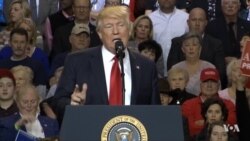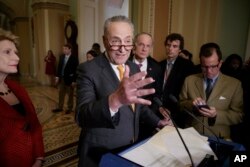In the wake of sliding poll numbers and a failure to repeal and replace President Barack Obama's signature health care law, some analysts are suggesting it might be time for President Donald Trump to consider hitting the political reset button.
Trump's public approval rating hit a new low this week, just 10 weeks into his young presidency. The Gallup Poll pegged Trump's approval rating at only 35 percent, a low point for a president this early in his term. Trump is trying to bounce back after the failed health care effort and may set his sights on tax reform and infrastructure spending as he seeks to deliver on last year's campaign promises.
When in need of a boost, Trump likes to return to his campaign roots and stoke up his supporters about his agenda, as he did at a recent rally in Louisville, Kentucky.
“These entrenched interests will do anything they can to keep the broken system in place. But they will fail, and we will win because we are fighting on the side of our great American heritage,” Trump said to cheers from those gathered.
Looking to rebound
Trump is looking to rebound after his failed effort to repeal and replace Obamacare, which fell apart because of Republican divisions. And though it is still early in his term, some analysts suggest it might be time for a policy and strategy reset.
“He has suffered a significant setback,” said political scholar Bill Galston with the Brookings Institution in Washington. “This ought to be an opportunity for reflection and perhaps reorientation of his presidency, certainly a change of strategy and tactics, if not of basic direction.”
The health care failure prompted all kinds of advice from critics, supporters and even former rivals like former presidential contender and former Florida governor Jeb Bush. Bush told a Miami TV station it might be time for the president to back off his Twitter habit.
“He should stop saying things that are not true that are distractions from the task at hand,” he said. Bush also said Trump has not made the transition from wanting to become president to actually being president. “He has not shifted to being president in the way that people are used to, and I think that is the problem.”
The health care defeat has emboldened opposition Democrats, including the woman Trump defeated in last November's election, Hillary Clinton.
“And when this disastrous bill failed, it was a victory for all Americans,” Clinton told a conference in San Francisco this week.
Republican divisions remain
The effort to undo Obamacare also has laid bare sharp divisions among Republicans that could bedevil Trump in the future, particularly if he moves on to tax reform, infrastructure spending and cutting the budget. Trump tweeted Thursday that “The Freedom Caucus will hurt the entire Republican agenda if they don't get on the team, & fast. We must fight them, & Dems, in 2018!”
The health care episode demonstrated the limits of Trump's ability to win over conservative members of his own party, according to Republican strategist John Feehery.
"I think he has to understand the power that he has, but also the power that he does not have. I mean, he is not dictator, he is not king," he said. "When he says ‘jump, congressional leaders are not going to say, How high? They are going to say, Why?'"
House Speaker Paul Ryan insists Republicans will make another effort on repealing and replacing Obamacare at some point.
“Obamacare is a collapsing law. Obamacare is doing too much damage to families. And so we are going to get this right,” he said.
Some have suggested Trump might turn to Democrats for help if he can't win over House conservatives. But Senate Democratic leader Chuck Schumer did not seem keen on that possibility this week.
“He'll have trouble constantly unless he moves to the middle. We are waiting for him to do it,” Schumer said.
Overcoming early stumbles
There is plenty of history to show that presidents can overcome early political stumbles to become effective later on. Franklin Roosevelt, John Kennedy, Ronald Reagan and Barack Obama all had their share of setbacks and defeats before achieving legislative success. And now the spotlight is on Trump to see if and when he can turn things around.
“The question is not whether newly-inaugurated presidents are fully equipped for the job, because most of them are not. The question is whether they can learn from their early mistakes and change course,” said Galston.
Part of the problem so far, according to Galston and others, is that Trump continues to primarily cater to his political base. That may be why Trump's approval numbers are stuck at about 40 percent, which even some Republicans believe represents the rough percentage of his core supporters.
Trump may be forced at some point to reach out more to Democrats if House members of the conservative Freedom Caucus remain reluctant to get behind Trump on some of his initiatives. The problem with turning to the Democrats, however, is that many of their constituents remain angry about Trump's election, and they are demanding that Democrats in the House and Senate oppose the president at every turn.
As University of Virginia expert Larry Sabato wrote in his political newsletter Thursday, “If history is any guide, Democrats will believe they have zero incentive to deal with Trump on much of anything,” particularly as they look ahead already to the 2018 congressional midterm elections.
Trump's challenges in dealing with his own Republican Party and with opposition Democrats come at a time when the president is attempting to follow in the footsteps of his predecessors, many of whom found it a challenge to make the transition from presidential candidate to commander-in-chief.

















